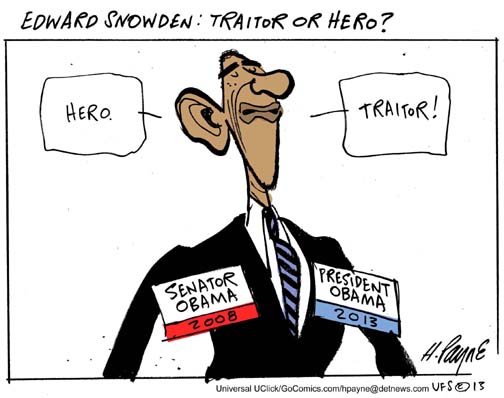
Hero or Traitor?
(Malaysia) on 14 June 2013
by Lin MingHua (link to original)
According to Snowden, the U.S. engages in surveillance activity in countries all over the world, including China, which it has long accused of hacking into U.S. government agency websites. Snowden has accused the FBI and CIA of collecting phone logs and mining vast amounts of data from Google, Yahoo, Facebook, Microsoft and nine other Internet servers — a serious breach of personal privacy.
Yet, what government wouldn't try to take advantage of this kind of capability? It is no big secret that the FBI has personnel all over the world working to gather intelligence; governments of other countries have long had a tacit understanding of this fact.
However, Snowden’s revelation has become an issue of morality for police and human rights activists residing in the U.S. It also created an embarrassing situation for President Obama, who had previously pressured President Xi Jinping about Chinese hackers accused of trying to steal U.S. state secrets.
Even more damaging to Sino-U.S. relations, Snowden chose to flee to Hong Kong, believing that Hong Kong has both a strong commitment to freedom of speech and the power of political dissent against the U.S. This decision was undoubtedly a slap in the face for America.
The scandal sent shockwaves across the world and caused a public outcry across Europe. It not only was a serious blow to America’s moral image but, to some extent, it also endangered U.S. security. Thus, a discussion has been sparked in the U.S. about whether the whistleblower is a traitor or a hero.
In the eyes of civil rights defenders and left-wing liberals, Snowden is, of course, a brave and self-sacrificing hero. The American Civil Liberties Union, the country’s most influential civil rights organization, has formally charged the federal government with violating the constitutional rights to privacy and freedom of speech, requesting that it reveal all secret surveillance programs.
A petition to the White House to pardon Snowden attracted 45,000 supporters in just one day.
This phenomenon perhaps embodies the American spirit that values individual human rights above love of country. This is one part of American political culture that is worth exploring and learning from.
On the other hand, the Republican Party, the Democratic Party and the White House have all accused Snowden of being a traitor who has endangered the American people. A national poll also shows that more than half of Americans are willing to accept government monitoring.
Back to the real issue — the boundaries between human rights, freedom of speech and national security have always been controversial. This is true especially in today’s Internet age, where freedom of speech can easily overcome censors and barriers, but increased egocentrism can also lead to extremism. People must determine what actions are too extreme, and what actions comply with universal values. Different people will make different value judgments, and will therefore arrive at different answers.
